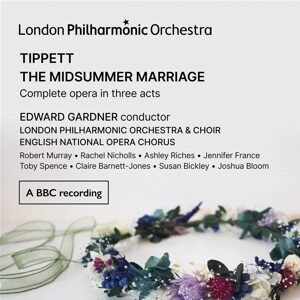Tippett’s The Midsummer Marriage, a modern retelling of The Magic Flute, is one of the major 20th-century operas. The music is tuneful, lyrical, bursting with energy, and wholly personal to its composer. The libretto is completely nonsensical–a jumble of myth, Jungian psychology, and operatic clichés, and yet as with all the best operas, the silliness of the words matters not a whit in the face of such magnificent music. The two are inextricably bound and each justifies the other. It could be no other way.
There has only been one other recording of this masterpiece, happily a very good one currently available on Lyrita, featuring Colin Davis and Covent Garden forces with a first-rate cast (I discount the grotty-sounding pirate version of the 1950s premiere with Joan Sutherland as Jenifer). This newcomer, a live concert version recorded on 25 September 2021, is just as good, and different enough to justify the duplication. Conductor Edward Gardner proclaims his dedication to Tippett’s music in a very sympathetic booklet note, and it really shows. His vision of the work feels a bit swifter than Davis’ although it really isn’t. Those lithe and lively rhythms, very fresh, but also a touch less emphatic than before, with the brass not as weighty, create the impression of comparative fleetness. The fact that the orchestra managed this rhythmically tricky and often awkward music so confidently in one go is frankly pretty amazing.
The cast consists primarily of young British singers, and there really isn’t a weak link among them. Robert Murray and Rachel Nicholls as protagonists Mark and Jenifer make a plausible pair of lovers. Murray’s voice seems at first a bit light for his Act 1 “love” aria, but he manages it quite well, while Nicholls manages her often crazy vocal lines with astonishing confidence. Jennifer France and Toby Spence, as the “comic” couple Bella and Jack are just about perfect. They have the second act all to themselves (along with the dancers), and they own it. That leaves Ashley Riches as a suitably stentorian King Fisher (Jenifer’s father), and mezzo-soprano Claire Barnett-Jones as a relatively light-voiced fortune telling Sosostris, who struggles at the (admittedly impossible) start of her Act Three aria, but warms up to it admirably as the pitch rises.
Recorded by BBC Radio 3 and the Royal Festival Hall, the sonics are well-balanced and vivid, the frequent choral contributions properly positioned both on and off-stage, and the packaging includes the insane libretto (English only, not that it matters). Davis’ version is still available on Lyrita, and at a lower price, but I can’t exaggerate the importance of this release. It confirms the work as one that casts its magic over a range of interpretations, and which surely deserves many more (I know, fat chance of that). A joy from start to finish.
































